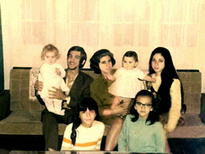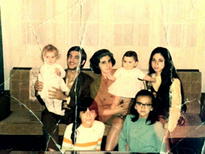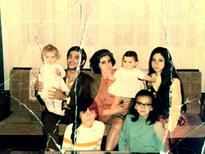BEIRUT 1963 / BEYROUTH 1963
’Beirut 1936’ shows a photograph of a family group – the artist’s family - sitting on a sofa in a living room. The soundtrack consists of the Garabedian family singing ’Happy Birthday’ in a sequence of languages – Armenian, Arabic, French, Dutch and English. This sequence of songs represents split and conflicted identities precipitated by war and migration. Against this jarringly cheerful background, the photographic image alters. Wrinkles appear, dividing family members from one another and from their surroundings. The colours fade, bleached by light exposure, revealing a large red discoloured patch in the middle. These blemishes appear gradually, growing in size and in the degree to which they obstruct the image itself, until eventually the picture is dominated by its transformation. The family is still there, in the picture, behind the divisions and discolourations, and slowly the original image returns, as the wrinkles fade and smooth themselves out. The family turns full circle, linking past and present across the division of the intervening years. The damage and the wrinkles to the original image represent the past, the transformation to and from the perfect image is only physical, the content remains. The members of the family do not age or change, and nor does the impact of diaspora and the genocide, present in the intimate family photo and in the history of the Armenian people. The tragic fate of both family and larger community is expressed in this moving piece, whilst the resilience and persistence of identity and structure is communicated in both the singing and in the restored photograph.



- Format miniDV(miniDV)
- Color system PAL
- Color col.
- Year 2003
- Duration 00:02:14
- Languageinfo
Spoken: French, Armenian, Arabic, Dutch/ Flemish, English UK
-
Artists
-
EVENTS